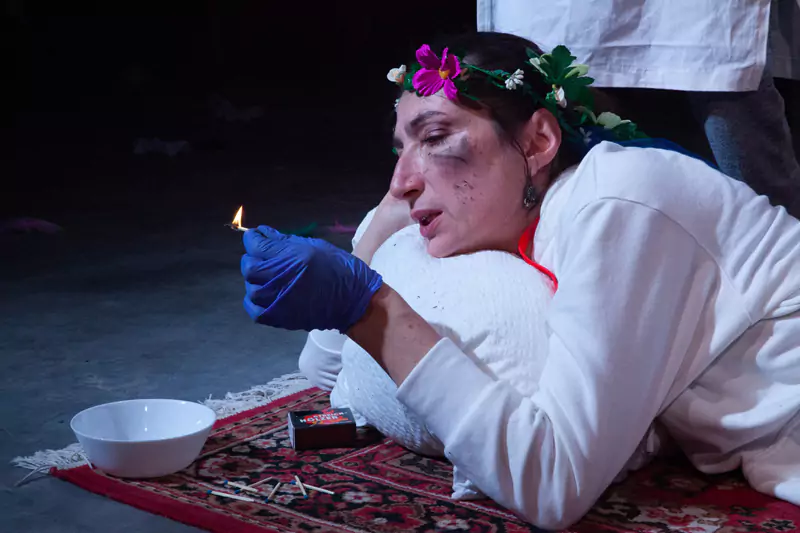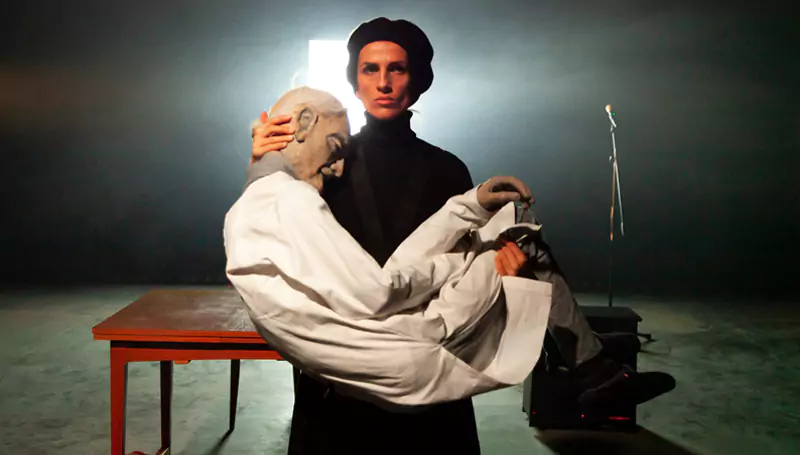“37 Zündhölzer oder das gestohlene Leben,” TNL
Dana Rufolo in Luxembourg
2 June 2024
Once again, Frank Hoffmann, artistic director of the Théâtre National du Luxembourg (TNL) has co-produced a play – 37 Zündhölzer oder das gestohlene Leben (37 Matches or the Stolen Life) that focuses on the emotional repercussions of one of the insidious problems in the European Union: the plight of caregivers from East European countries (Bulgaria in this case) who travel to Germany to tend and treat ageing people who are sick and bedridden with families who can afford the cost of maintaining them in the privacy of their home.

Snezhina Petrova as Elena.
Photo credit: TART Production.
The problem in Europe is twofold: as the Bulgarian cast from the company 36 Monkeys Sofia explained after the show how, there are no longer enough caregivers in Bulgaria to tend their own elderly bedridden citizens. This is a lesser-known fact. More commonly known is that these caregivers are often exploited by the families who hire them – denied time off, subjected to abuse by their patients who are frequently suffering from senility and have little self-control, criticized by the hiring families who see them as thieves and sneaks, underpaid, homesick and obliged to live painfully lonely existences. There can be a further complication, which this play explores, this being rejection by the home family.
37 Matches or the Stolen Life is an intra-European collaboration created at the FITZ Theater in Stuttgart; it premiered in Sophia, Bulgaria, and then in Stuttgart in 2023 and was at the TNL on May 15 and 16, 2024. The troupe is assembled from a mélange of actors (including one Luxembourger, Véronique Kinnen) who seem to have been trained in differing acting styles. So, the production comes across in many ways as a roughhewn form of agit-prop theatre.
However, it acquires poetic intensity, because the patient is a beautifully carved wooden puppet designed by Antje Töpfer who is handled with great skill by Manuela Sarkissyan. She worked long hours with the director Bernhard M. Eusterschulte to develop a slow-motion relationship to the puppet that remarkably lends it animation. The caregiver, Elena, is played by the Bulgarian actress Snezhina Petrova. She also shows affection for her wooden patient, despite his grouchiness, as she cradles him or gently shifts his supine body, so that he takes on the character of an ethereal creature whose lined face and look of repose conveys the childishness of vacuous old age.
The text was co-authored by Zdrava Kamenova and Gergana Dimitrova who often write plays together. They have worked already with Eusterschulte, who is keen on presenting plays about conflictual social issues. The drama begins when Elena, needing to earn money, is charmed by the loud-spoken fast-promising agent hiring caregivers, played by American-born and English-speaking Nathan Cooper. She signs up to care for a Stuttgart-based old man, leaving her daughter in Bulgaria with her mother in order to do so.
Inevitably, loneliness and disillusion set in: Elena’s mother increasingly sees Elena as nothing but a source of money, and the German-speaking head of the Stuttgart family she works for (played by Kinnen) accuses Elena of planning to steal a valuable painting they own which is represented on stage as a shimmering framed emptiness – a glowing computer screen or a door into the nowhere of eternity. The ultimate shock is when Elena’s daughter unabashedly reports via mobile phone that she told her class teacher that her mother is dead in order to avoid the embarrassment of revealing that Elena is a lowly caregiver in Germany.
I had thought that Elena might strike a match to set fire to the home where she works day and night, alienated from love and affection. But no. Elena strikes matches so as to light cigarettes that she puffs on slowly and with relish – an act of immediate gratification that indicates she hasn’t the energy to imagine a long and healthy life. She is too resigned to be indignant.
In keeping with its activist modus operandi, the TNL invited students studying to be caregivers at Luxembourg’s Lycée Technique pour Professions de Santé to 37 Zündhölzer oder das gestohlene Leben. After the play, the floor was open for discussion, and these students were encouraged to ask questions of the actors and playwrights in the hope that when they begin to work for their own aged nationals, they will have a greater understanding of the polemics of intra-European caregiving.









